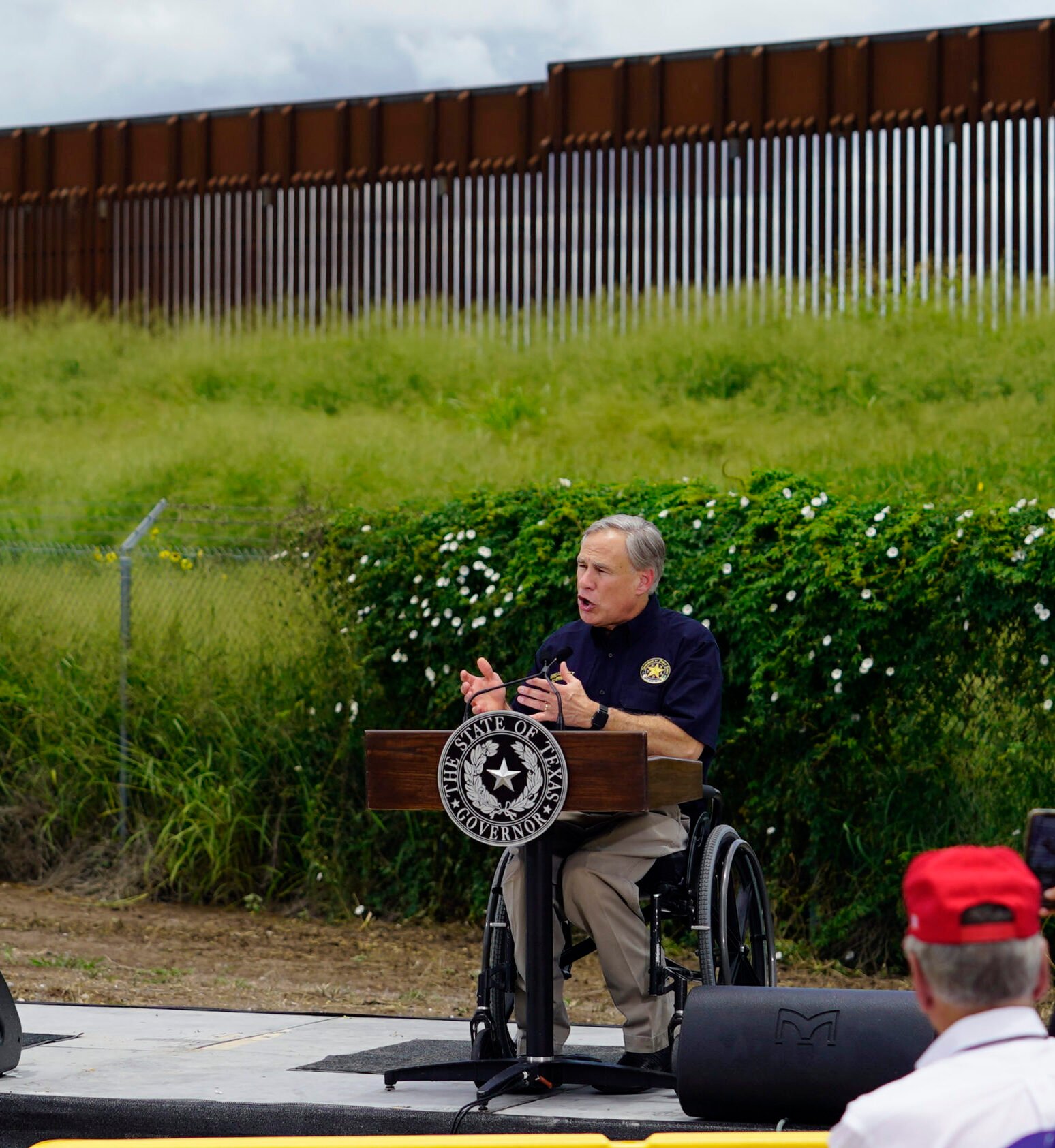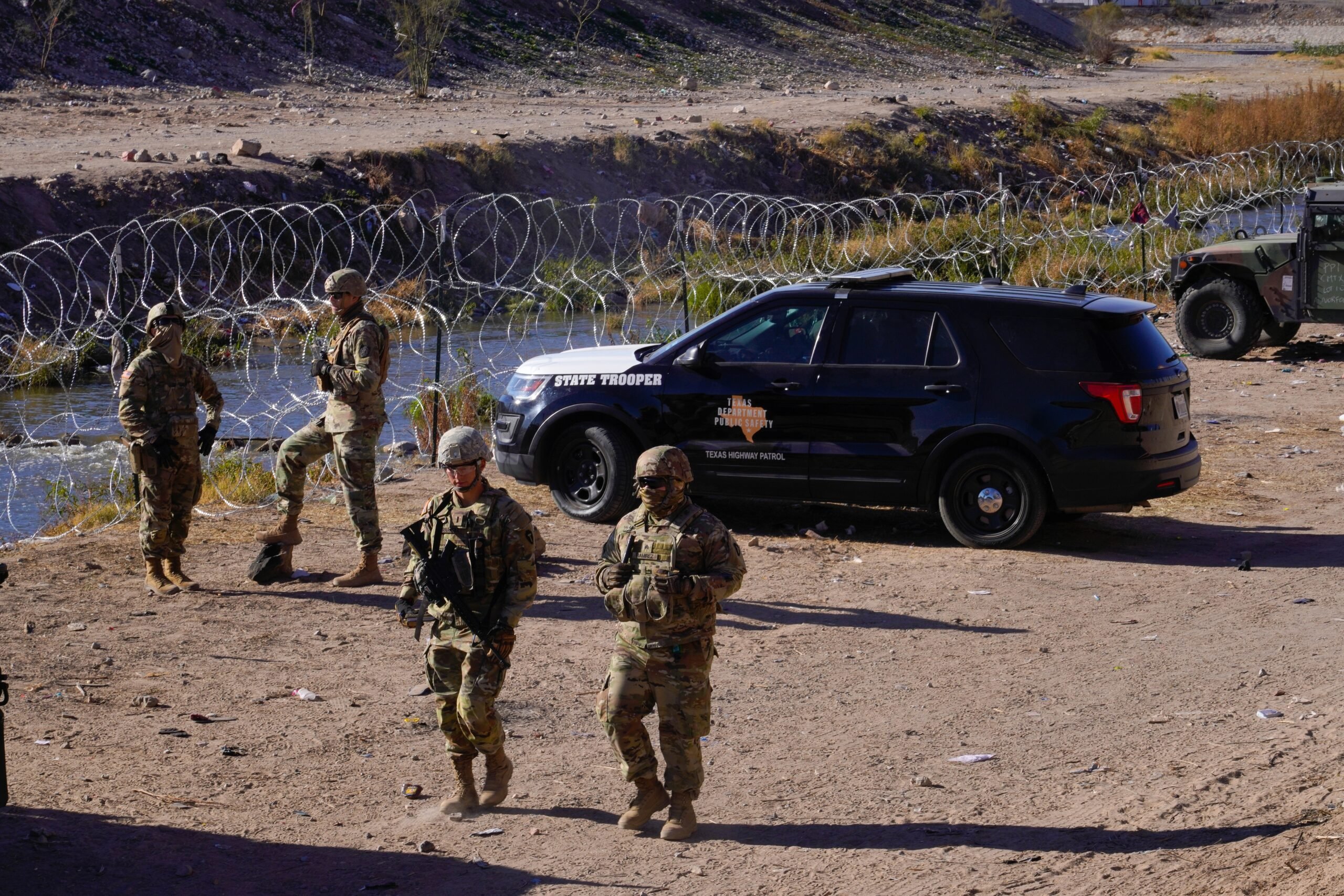
‘Colossal Waste of Money’: Texas Nears $1 Billion in Border Wall Contracts
The Webb County coalition that opposed Trump’s boondoggle is now scrambling to oppose the state’s expanded construction plans.

As Governor Greg Abbott’s scheme to wall off Texas from Mexico quickly and quietly accelerates, the state has now doled out $830 million in contracts to raise over 30 miles of border barrier.
Last week, the Texas Facilities Commission approved its fifth construction contract for the project, worth $137 million, to erect nearly 7 miles of steel-bollard fencing along the border in Webb and Zapata counties. That’s on top of the over 9 miles that the state contracted to build in Webb earlier this month.
Home to the cross-border economic hub of Laredo, vast Webb County has fought to remain the only major border county in the state without a federal wall—apart from a small portion on a college campus. In the final months of the presidency of Donald Trump, his administration fast-tracked plans for several miles of wall through Laredo and the surrounding region, prompting staunch resistance from a broad and unlikely coalition of local opponents ranging from wealthy ranchers to environmentalists. Those plans were ultimately thwarted by President Joe Biden, whose administration canceled all active border wall construction contracts.
Now, the region is once again in the crosshairs thanks to Abbott’s taxpayer-funded political venture to carry on Trump’s wall-raising legacy.
“It’s just sad that we’re back at this all over again,” Tricia Cortez, Laredo environmental activist and co-founder of the No Border Wall Coalition, told the Texas Observer. “It’s a colossal waste of money on a project that’s not going to do much to fix the challenges we have with migration. And they know that.”
The state agency, which is working in coordination with the Texas Department of Public Safety, has kept a tight lid on the details of its border wall construction plans—including when and where it’s going—citing security concerns and claiming that such transparency would potentially delay and add costs to the project.
“It’s just sad that we’re back at this all over again.”
Cortez said that her coalition, along with elected officials in Webb County, knew nothing about the state’s plans to build in their backyard until the contracts were awarded. Her coalition is now scrambling to find out more details about where the state is planning to build and which landowners have been contacted.
State contract records provide limited clues. The first wall contract for Webb County was awarded to Fisher Sand & Gravel earlier this month for just over 9 miles. A redacted version of that contract says that the first tract of the contract is located on private land “northwest” of Laredo. Documents from the agency’s hired project manager show proposed plans to build several miles along private ranch land in northwestern Webb, and several miles south of Laredo through the small towns of El Cenizo and Rio Bravo.
Asked about project locations for these contracts, the agency’s spokesperson Francoise Luca said, “Specific project locations are not being released at this time.”
Carina Hernandez, the new mayor of El Cenizo, recently told the Laredo Morning Times that she was aware that representatives of the state had approached the town about buying city parkland to build its wall but that she had not committed to continuing any negotiations. Melissa Cigarroa, a Laredo City Council member and anti-wall activist, told Border Report that she’s heard the state is offering some property owners around El Cenizo and Rio Bravo roughly $18,000 for land rights. While agreements are voluntary, she said the state is “preying on people who don’t, I think, understand the full impact of what a wall would be. They’re offering them what is essentially the sum of an entire year’s income for the right of way.”
The Facilities Commission said that this is likely the last contract that will come from the $900 million pot of taxpayers funds state lawmakers initially allocated for Abbott’s wall in 2021, but plenty more money is coming down the pipeline. “Somethin’ tells me the Legislature might do that,” Facilities Commission Chairman Steven Alvis said at the commission’s meeting last week.
Indeed, the previous day, the Texas House and Senate released their budget proposals, both of which would keep the state’s border security spending for Operation Lone Star at record levels: $4.8 billion for the next two years. The Lege plans to give $1 billion of that directly to the governor’s office. About two-thirds of that—$650 million—will be dedicated to the wall, budget documents indicate, ensuring that the trough for border wall contractors will stay open. That figure could also easily balloon if Abbott presses lawmakers for more.
The state gave the latest contract to the Sullivan Land Services Company (SLSCO), a construction and disaster response firm owned by a trio of brothers from Galveston. The Sullivan brothers’ outfit has won major government business in Texas over the years, including over $300 million in services provided for the state’s COVID-19 response and Operation Lone Star border mission, state spending records show. Much of that has come in the way of no-bid emergency purchases, permitted by Abbott’s ongoing disaster declarations that suspend typical competitive bidding procedures.
The brothers—John, Todd, and Billy—have also been generous donors to Abbott’s campaigns, collectively giving him over $250,000 in contributions over the years, according to state campaign finance records.
SLSCO also became a top contractor for Trump’s wall, winning bids worth nearly $2 billion in contracts to build along the border in Texas, New Mexico, and California, though most of those were voided by Biden. After soliciting bids for design-build contractors last year, the Facilities Commission selected SLSCO and four other firms that previously held federal border wall contracts as exclusive contractors for the state project.
Since launching the project in the summer of 2021, Texas has completed just 1.6 miles of border wall on state-owned land in Starr County while construction recently began along a segment of private land in Cameron County. But with this latest contract, the state now has over 30 miles of planned wall assigned to a quintet of construction firms. Facilities Commission officials insist that the project will pick up momentum in the new year as the state secures more land.
At its current rate of cost, the tab for Texas taxpayers would be upwards of $17 billion.



